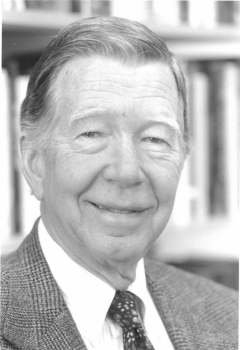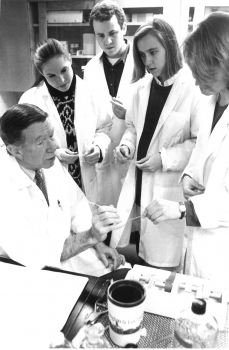In Memoriam: Len Jarrard The Robert Lee Telford Professor of Psychology retired in 2001.
Leonard E. Jarrard, Robert Lee Telford Professor of Psychology Emeritus, died Oct. 11, 2022. He was 91.
He received his B.A. from Baylor University (1955) and his M.A. (1957) and Ph.D. from Carnegie Institute of Technology (1959). From 1952 to 1954, Jarrard served in the Air Force.
Jarrard joined the W&L faculty for the first time in 1959. In 1965, he accepted a one-year National Institutes of Health fellowship at the University of Florida College of Medicine, where he specialized in experimental neurosurgical techniques. Upon leaving Florida, Jarrard returned to his graduate alma mater, now Carnegie Mellon University, where he taught and conducted research from 1966 to 1971. He returned to W&L in 1971 as professor of psychology and head of the department. In a university publication from the 1970s, Jarrard wrote, “One of the important considerations in my decision to come back to Washington and Lee was that I missed the exposure to undergraduates an awful lot.”
During his 19-year tenure as department head, Jarrard solidified the department’s emphasis on experimentally oriented psychology and expanded its base by hiring faculty who shared his vision and views on the importance of undergraduate research. Jarrard successfully brought in more than $1 million from the National Science Foundation, as well as other sources, to support student summer research, purchase equipment and hire research technicians. He was also the moving force behind the creation of the interdisciplinary neuroscience program in 1990 and chaired this rigorous and popular major from its beginning until his retirement in 2001. He also established an exchange program between University College, Oxford, and W&L, which for 20 years offered enriching academic and cultural opportunities for professors and students alike.
Jarrard became known globally among neuroscientists for his elegant and rigorous research on the hippocampus, a structure in the brain most often associated with learning and memory. Jarrard’s research, which deftly combined innovative surgical techniques and ingenious behavioral tasks, challenged popular views of the hippocampus’ function — not once, but several times during his career. He published over 100 papers and presented his work at countless professional meetings, gaining a reputation as one of the foremost experts in the field. His work was so important to the field that he was invited to write the lead article for Hippocampus’ inaugural edition. In 1992, he was elected a fellow of the American Association for the Advancement of Science.
Throughout his career, Jarrard interacted with an astonishing number of scientists from near and far — from VMI to Japan, Canada, England, France, Morocco and New Zealand — including two who would go on to win the Nobel Prize in medicine. Many even traveled to Lexington to learn Jarrard’s surgical techniques. One colleague remembered grading an exam where the student quoted one of Jarrard’s most important papers to answer the question, “What does the hippocampus actually do?”
In the classroom, Jarrard was a respected and beloved teacher. He taught Brain and Behavior, Physiological Psychology and Psychoactive Drugs and Behavior — a highly popular Spring Term class. In seminar settings, Jarrard masterfully blended his research focus with pedagogy to produce a superb example of how scholarship and teaching are intimately intertwined. He led many of his students to successful research careers. In 1987, he received the Outstanding Faculty Award from the State Council for Higher Education in Virginia, and he was named the Robert Lee Telford Professor of Psychology at W&L in 1991.
Jarrard was a lifelong academic. For almost 20 years following his retirement, he continued his research collaborations with far-afield colleagues, maintained a near-daily practice of working in his W&L office, continued to socialize with departmental colleagues and mentored young faculty members. All his colleagues remember Jarrard as an extraordinarily thoughtful and careful scientist and as a kind and gentle person.
Outside of his career as a scientist and professor, Jarrard was a union card-carrying jazzman. He played trumpet to help with the costs of his education in Pittsburgh and continued to play for many years. He was a favorite at Parents and Family Weekend jazz concerts. Jarrard always looked forward to the Society for Neuroscience meetings where he was a member of a band of distinguished neuroscientists. As one said, “Those of us who had the opportunity to play jazz with him will remember his extraordinary and influential musical talent.”
Jarrard is survived by his wife, Janet “Jan”; three children, Alice, David and Hugh; and five grandchildren.
The family looks forward to welcoming friends to a celebration of Jarrard’s life at Hotchkiss Alumni House at W&L on Nov. 26, from 3 to 6 p.m.
In lieu of flowers, they ask that donations be made to Rockbridge Area Hospice, 315 Myers St., Lexington, VA 24450 or to the Len Jarrard Endowment in Neuroscience, Attn: Development Office W&L University, 204 W. Washington St., Lexington, VA 24450
 Professor Len Jarrard
Professor Len Jarrard Professor Len Jarrard (c.1993)
Professor Len Jarrard (c.1993)
You must be logged in to post a comment.